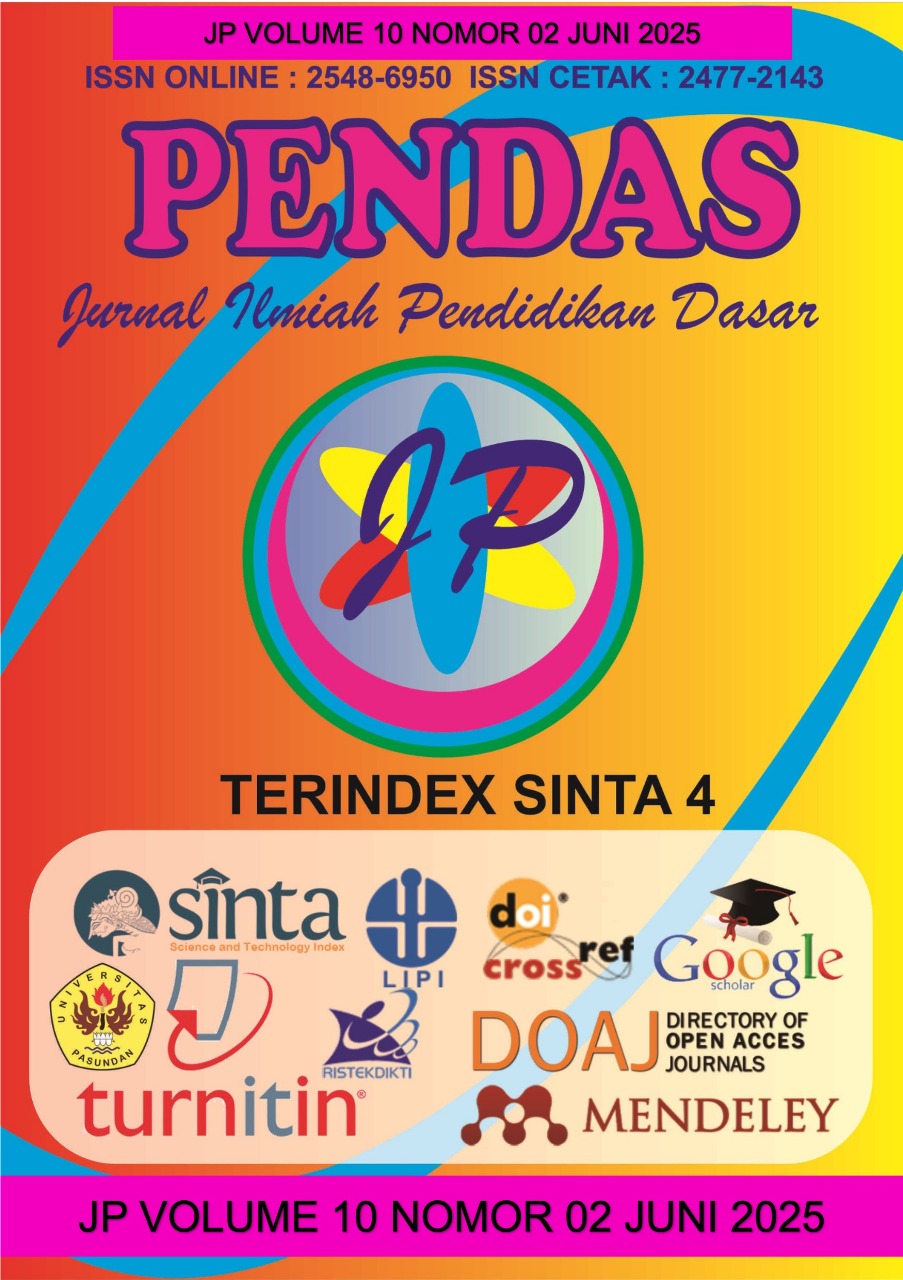PENGEMBANGAN MODUL AJAR PEMBELAJARAN MATEMATIKA BERDIFERENSIASI BERBASIS KHAN ACADEMY KIDS BERMUATAN TPACK UNTUK MENINGKATKAN KEMAMPUAN PENALARAN MATEMATIS SISWA FASE A SD
DOI:
https://doi.org/10.23969/jp.v10i2.24019Keywords:
differentiated, khan academy kids, TPACKAbstract
The background of this study is the lack of teaching materials that integrate technology into learning. This study aims to develop and test the validity, practicality and effectiveness of a differentiated Mathematics learning module based on Khan Academy Kids containing TPACK to improve the mathematical reasoning skills of Phase A elementary school students. This study uses the Research and Development (R&D) method with the ADDIE research model consisting of five stages, namely: (1) Analysis; (2) Design; (3) Development; (4) Implementation; (5) Evaluation. The subjects of the study were 25 students in grade I of SDN Sampangan 01 Semarang. Data collection instruments included expert validation sheets, teacher response questionnaires on the practicality of the teaching module, and pretest and posttest mathematical reasoning ability tests to measure effectiveness. The results of the study showed that: (1) The developed teaching module was declared valid based on expert assessments with an average score of 99.3% or in the very valid category. (2) The teaching module is declared practical to use based on the acquisition of a score of 75% or is included in the practical category. (3) The effectiveness of the teaching module through the Paired Sample T-Test shows a Sig. (2-tailed) value of 0.000, which indicates an increase in students' mathematical reasoning abilities before and after the learning process is carried out. The SPSS output data from the summary of descriptive statistics shows that the average pretest score is 10.1600 and the average posttest is 11.7600. The N-Gain value obtained is 0.3725. This shows that the development of a differentiated Mathematics learning module based on Khan Academy Kids containing TPACK is effective in improving the mathematical reasoning abilities of elementary school phase A students.
Downloads
References
Andani, M., Haki Pranata, O., & Hamdu, G. (2021). Model Problem Based Learning pada Pembelajaran Matematika Sekolah Dasar. In All rights reserved (Vol. 8, Issue 2). http://ejournal.upi.edu/index.php/pedadidaktika/index
Astria, R. T., & Kusuma, A. B. (2023). Analisis Pembelajaran Berdiferensiasi Untuk Meningkatkan Kemampuan Berpikir Kreatif Matematis. https://doi.org/10.30605/proximal.v5i2.2647
Hasnida, S. S., Adrian, R., & Siagian, N. A. (2023). Tranformasi Pendidikan Di Era Digital. Jurnal Bintang Pendidikan Indonesia, 2(1), 110–116. https://doi.org/10.55606/jubpi.v2i1.2488
Hendana, I. P., & Lestari, K. E. (2024). Pengaruh Kemampuan Penalaran Matematis Terhadap Kemampuan Pembuktian Matematis Siswa. Jurnal Ilmiah Matematika Realistik (JI-MR, 1(1), 198–204.
Indarta, Y., Jalinus, N., Waskito, W., Samala, A. D., Riyanda, A. R., & Adi, N. H. (2022). Relevansi Kurikulum Merdeka Belajar dengan Model Pembelajaran Abad 21 dalam Perkembangan Era Society 5.0. Edukatif: Jurnal Ilmu Pendidikan, 4(2), 3011–3024. https://doi.org/10.31004/edukatif.v4i2.2589
Ismail, R., & Imawan, O. R. (2021). Meningkatkan Penguasaan TPACK Guru di Papua Melalui Pelatihan Pembuatan Video Pembelajaran Pada Masa Pandemi Covid-19.
Meria, U. G., & Neviyarni. (2022). Pembelajaran Berdiferensiasi Pada Pembelajaran Matematika di Kurikulum Merdeka. 3(3), 2022. https://doi.org/10.46306/lb.v3i3
Naibaho, D. P. (2023). Strategi Pembelajaran Berdiferensiasi Mampu Meningkatkan Pemahaman Belajar Peserta Didik.
Nissa, I. C. (2022). Edukasi Integrasi HOTS Dalam Pengembangan Modul Ajar Kurikulum Merdeka Pada Guru SD Program PPG. Indonesian Journal Of Community Service, 2.
Oktori, A. R., Yulizah, Y., Amrillah, H. M. T., & Arif, M. (2024). Kurikulum Merdeka: Paradigma Baru Inovasi Pembelajaran Abad 21 di Sekolah Dasar. Limas PGMI, 05(02). https://doi.org/10.19109/limas_pgmi.v5i2.23406
Purba, A., & Saragih, A. (2023). The Role of Technology in Transforming Indonesian Language Education in the Digital Era. Alfitriana Purba; Alkausar Saragih AFoSJ-LAS, 3(3), 43. https://j-las.lemkomindo.org/index.php/AFoSJ-LAS/index
Rahayu, E. W. (2021). Pemanfaatan Game Edukasi Untuk Meningkatkan Kemampuan Literasi Siswa di MI YAPPI Balong Girisubo.
Rizki, A., Ilmi, M., Junaidi, A., Yusnanto, T., Kase, E. B. S., Safar, M., & Sari, M. N. (2024). Belajar di Era Digital: Memahami Teknologi Pendidikan dan Sumber Belajar Online. Communnity Development Journal, 5(1), 782–789.
Samsul, N., Sdn, M., & Batu, P. (2022). Peningkatan Ketrampilan Guru Dalam Penyusunan Modul Ajar Untuk Pembelajaran Kelas 1 SD Melalui Supervisi Akademik. Jurnal Pendidikan Taman Widya Humaniora (JPTWH), 1(1). https://jurnal.widyahumaniora.org/
Syarifah, Z. A., Yanuarto, W. N., & Purwokerto, U. M. (2023). Eksplorasi Pembelajaran Matematika Berbasis Technological Pedagogical and Content Knowledge (TPACK). 6(2). https://doi.org/10.30605/proximal.v5i2.2722
Wati, D. N., Nindiawati, D., Subandowo, M., & Rusmawati, R. D. (2021). Pengembangan Bahan Ajar Matematika untuk Siswa Kelas V Sekolah Dasar.
Downloads
Published
Issue
Section
License
Copyright (c) 2025 Pendas : Jurnal Ilmiah Pendidikan Dasar

This work is licensed under a Creative Commons Attribution 4.0 International License.














































